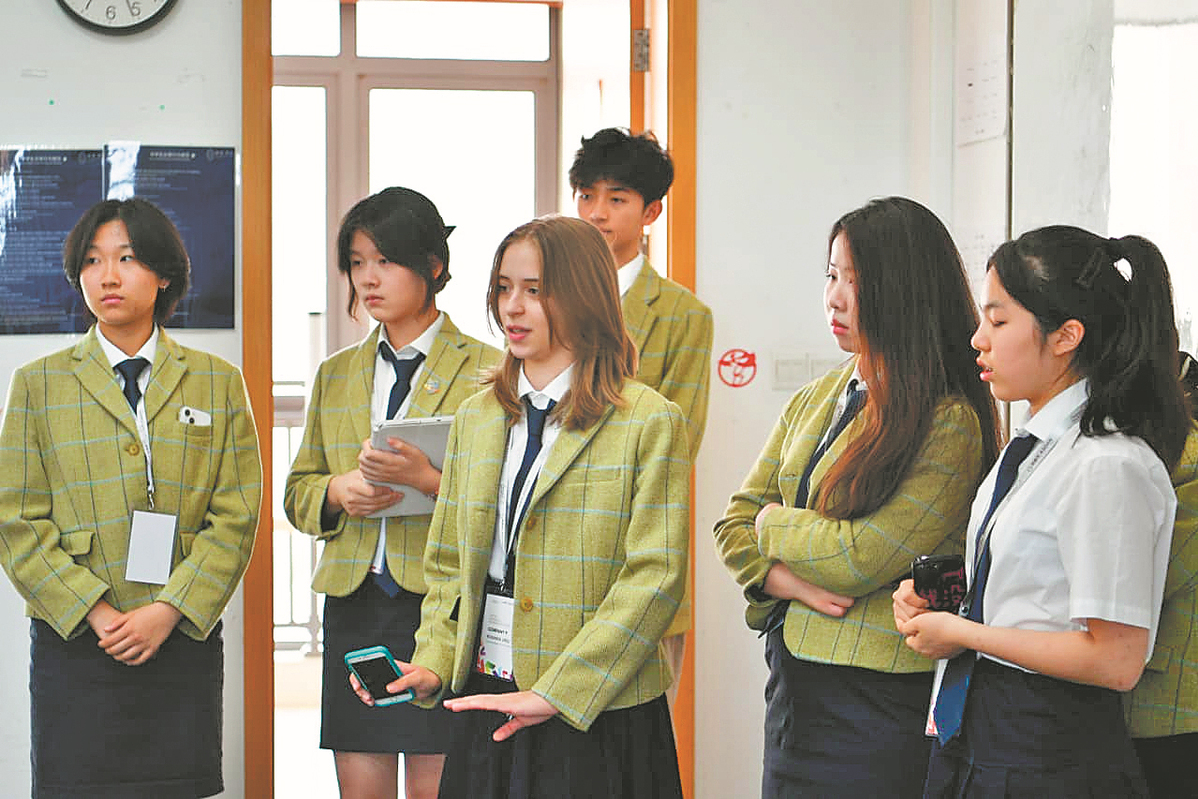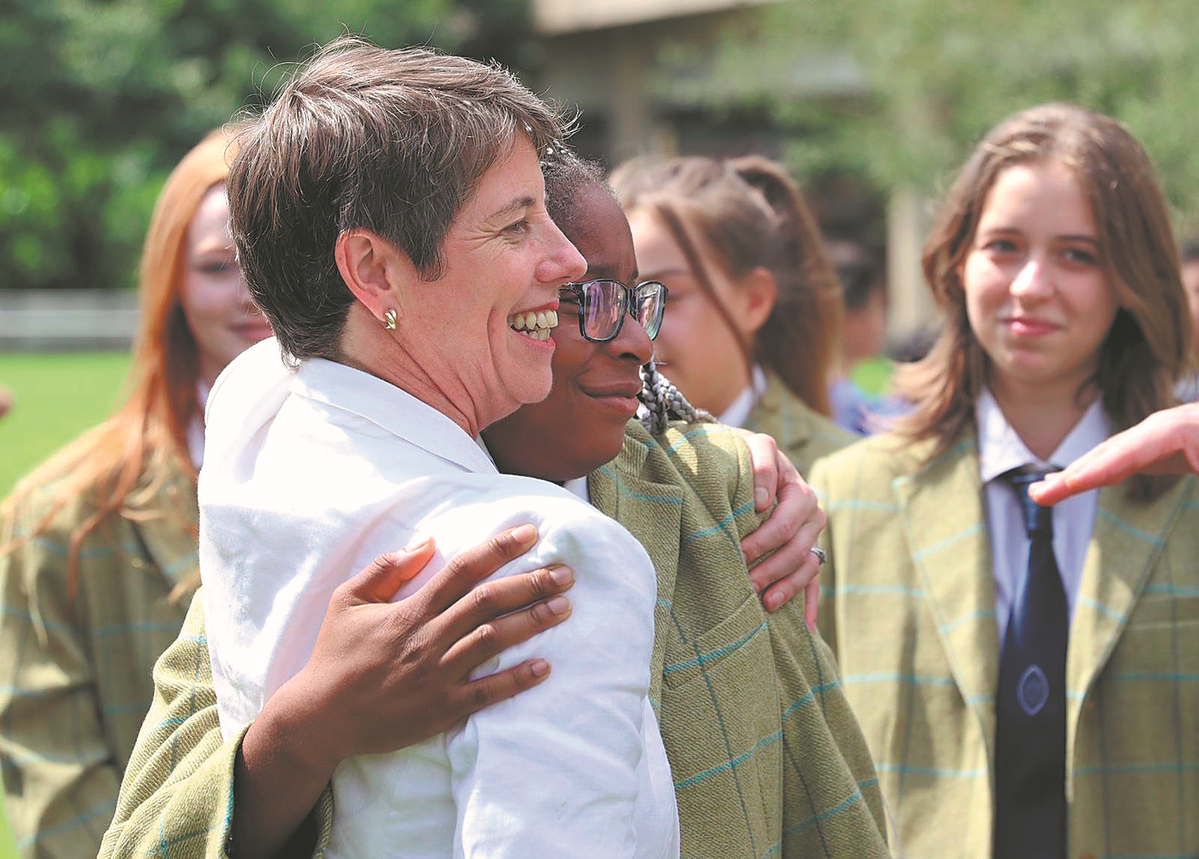From culture shock to a 'second home'
Program opens UK youths' eyes and fosters 'China literacy'


"I felt like I was leaving a part of myself in China because it has been a very tough journey to integrate myself into the culture and connect with the people here," said Calista Ajibola, a British student aged 18, who has just completed a two-year boarding school scholarship program in China.
Even for someone who had been learning Mandarin for five years and who had achieved the top grade in the subject in her General Certificate of Secondary Education exam, or GCSE, the test taken by students in the United Kingdom at the age of 16, using the Chinese language, still posed some challenges, as textbook knowledge and real-life application can be very different disciplines.
"People often couldn't understand me when I first arrived in China and would ask me to switch to English. I had scored a nine in my GCSE Mandarin exam, so it was incredibly frustrating, at times even disheartening," she said.
"But as time went on, armed with the courage to make mistakes, a determination to improve, hours of practice, and plenty of help from my Chinese teacher, my Mandarin eventually reached the point where I could … guide my family around in China, chat with taxi drivers, haggle over prices, and sort out problems that came up."
Ajibola returned with a mature command of the language, a clearer vision for the future, many genuine friends, countless memories, as well as 30 packs of Chinese-branded instant noodles, and a pile of refrigerator magnets.
"The scholarship program is probably one of the best things that has ever happened to me," she added.
Launched in 2023 by the UK charity Engage with China, in partnership with international schools in China, the scholarship program has enabled 34 British pupils to embark on a two-year journey to study A-levels in China.
H-J Colston-Inge, director of Engage with China, said the aim of the program is to foster "China literacy" among British youths.
It was in 2018 that she realized there was a major educational gap in UK schools, as knowledge of China was almost entirely absent from the classroom. "The UK curriculum contains virtually no content on China, despite its global importance," she said.
Compared to short-term study programs, she said, the project aims to offer a fully immersive journey, one that allows pupils to truly experience, with their own eyes a country on the other side of the world that is culturally and socioeconomically, very different from what they are used to.
Culture shocks can be striking. For Ajibola, the endless high-rise apartments instead of low houses, the "motorcycle army" dominating the roads, and the mosquito bites in the sweltering summer were all unusual for a British pupil. But as she put it: "If I had the chance to live it all again, I wouldn't change a thing."
Zoe Capps, who has just completed her first-year scholarship in Hangzhou, the capital city of East China's Zhejiang province, said life in China, a place where "everything felt unfamiliar" at first but which has now become a "second home", has made her much more "mature".
"I always used to say I'm very mature for my age, but I really wasn't," she said. "But now, I have a clear idea of what I want to do in the future. I know where I want to go, and I know what I need to do."

Gaining global mindset
The students have not only developed strong language skills that will give them greater competitiveness in future education and career paths, Colston-Inge said, but have also gained a global mindset and a sense of empathy, an understanding that the world can be vastly diverse.
"No one typically sends their 16-year-old to study in China, so these students are bold, curious and globally-minded," she added. "In an era of geopolitical tension, initiatives like this can help shift perspectives and build better international relationships."
"Life-changing" is how Colston-Inge often described the many refreshing China stories she has heard from the pupils, especially since many of the scholarship winners come from economically disadvantaged backgrounds.
Yet in such an unprecedented and turbulent era, even just ordinary educational exchanges can hardly remain untouched by geopolitics.
"It is more important than ever that, when there are difficulties, we push through," she said.
"Children aren't interested in politics," she pointed out. "Well, maybe a little. But that is not what they want. They want to make friends. They want to play. They want to do music together, play sports and so on. That is what's important."
For Capps, above all, it is also the friendships she has made during the first year that matter the most. "The people I've met here have become some of the most important things in my life."
Soon, the third cohort of 10 teenagers will head to China, ready to begin an entirely new chapter in their lives.
Colston-Inge, who studied Chinese at university and is now dedicated to passing on her enduring fascination with China to the next generation, quoted Laozi, a Chinese philosopher from the Spring and Autumn Period (770-476 BC), "A journey of a thousand miles begins with a single step."
"Having 34 (scholarship winners) looks tiny, but just compare that with the 250,000 students coming from China to study in the UK, and that previously, very few children were going to China at the age of 16."
At a reception hosted on Aug 12 by the Education Section of China's embassy in the UK, to welcome the scholarship winners, Zhao Fei, minister of China's embassy in the UK, said tomorrow's world needs builders of bridges between civilizations, especially in an era when challenges ranging from global health crises to climate change require collective effort.
"Though our languages differ and customs vary, our aspirations for a better life and shared concerns for humanity's future resonate profoundly," he said.
"This connection transcends borders, it is universal and it is shared."


































